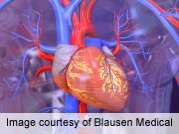Fitness and obesity are independently associated with cardiometabolic risk, according to a study published in the April 1 issue of The American Journal of Cardiology.
(HealthDay)—Fitness and obesity are independently associated with cardiometabolic (CM) risk, according to a study published in the April 1 issue of The American Journal of Cardiology.
Michael N. Vranian, M.D., from Johns Hopkins Ciccarone Center for the Prevention of Heart Disease in Baltimore, and colleagues evaluated 2,634 Brazilian adults referred for employer-sponsored heath exams. Obesity was defined as body mass index >30 kg/m² or when body mass index was 25 to 30 kg/m², waist circumference >102 cm in men and in women or >88 cm in women. The Ellestad treadmill stress test was used to gauge fitness, with those completing stage 4 considered fit. Ultrasound was used to measure hepatic steatosis. Participants were classified as fit and normal weight, fit and obese, unfit and normal weight, and unfit and obese.
The researchers found that 22 percent of patients were obese, and 12 percent were unfit. There was a moderate correlation between fitness and obesity. There were 6.5 percent unfit and normal-weight subjects and 16 percent fit and obese subjects. There was a significant negative association between fitness and CM risk in overweight and obese patients. Increasing body mass index was significantly positively associated with CM risk in fit patients. Obesity was the stronger determinant of CM risk in cases of discordance between fitness and obesity.
"The effects of fitness and obesity are additive, but obesity is more strongly associated with CM risk when fitness and obesity are discordant," the authors write.
More information:
Abstract
Full Text (subscription or payment may be required)
Journal information: American Journal of Cardiology
Health News Copyright © 2013 HealthDay. All rights reserved.


















